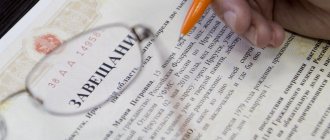Checking the fact of inheritance
If you are on good terms with your relatives, they will inform you of the death of the testator and tell you about the remaining property. But if it is not possible to obtain any information from them, you should contact a notary at the place of last residence of the testator.
You can find out whether inherited property has been left to you or not only after the death of the testator.
When contacting a notary office, you must submit a certain list of documents. It is worth considering that a notary may refuse to accept an applicant’s application for inheritance if more than 6 months have passed since the opening of the inheritance.
Read more about ways to check inheritance rights in the material “How to find out about inheritance.”
What is the Unified Register of Wills and Probate Affairs?
Often people have no idea how to find out whether there is a will or not. Lawyers recommend contacting a notary at the place of registration of the deceased citizen, but this approach does not always give the desired result. To save your own time and get the most accurate information, you should use a service such as a unified register of wills and inheritance cases.
This service should be understood as an electronic database where data on wills and other documents from all regions is entered. Citizens who have access to the system have the right to obtain the necessary information:
- whether a will was drawn up;
- who drew up and certified the document;
- at what address the document is stored;
- what cases related to the order of inheritance are being conducted today.
The electronic database accumulates information from all notaries, civil servants and other authorized persons involved in the management of matters related to inheritance. It is important to emphasize that each notary is obliged to register a document, and then submit information to the registry, and if he refuses to comply, the specialist will be held liable, up to and including deprivation of a license to engage in notarial activities.
How to find out if there is a will
Since citizens present when drawing up a will do not have the right to disclose the existence and contents of the document, it is not easy to find out whether a deceased relative left a will.
Until the day the inheritance is opened, the notary and witnesses are required to keep secret information about who the testator bequeathed his property to.
Only after a relative has passed away can you try to find the papers. However, heirs most often do not know where to make requests to search for the property of the deceased.
If the testator does not inform about the place of storage of the document, the heirs have to search for it on their own. You can find the paper in the testator’s apartment, at the notary at the place of last registration of the testator, or by sending a request to the notary chamber.
More detailed information on how to find a document proving the existence of inheritance rights is in the article “How to find out if there is a will for inheritance.”
Request from a notary
The person’s will is recorded on paper and certified by a notary present. One of the copies is kept in the office; contacting a specialist is considered the best option for finding paper.
How to find out which notary has a will? Make a list of notary offices located near the place of residence of the deceased relative. To obtain information about the existence of a will, you will need a copy of the certificate confirming the death of the subject. When a person asks for data without supporting documentation, he will not receive a response.
Important! The discovery of a will, where the person looking for it is not designated as a legal successor, does not give him the opportunity to familiarize himself with the text. The notary has no right to disclose information to persons not included in the document.
The notary office employee will require you to present official papers:
- general civil passport;
- marriage certificate, birth certificate, papers confirming the degree of relationship with the testator.
How does a notary find out about the death of the testator? After a person interested in the outcome of the case contacts him, he does not have the right to submit requests to the registry office to obtain information.
A large urban area may be home to several notary offices. The interested subject has the right to contact any specialist. It is not easy to find out who has the will.
You cannot stop searching for the paper; you need to get information about the last months of your relative’s life. The following officials have the right to certify a will:
- chief doctors, heads of medical institutions;
- prison governors;
- managers of nursing homes;
- commanders of military units;
- ship captains;
- expedition leaders.
Recommended reading: Wills in emergency circumstances
Whom does the notary inform?
The notary notifies only those heirs whose place of residence is known to him about the opened inheritance. If the heirs do not know about the opening of the inheritance and do not enter into their rights within six months, they can restore the missed period within 3 years from the date of receipt of information about the death of the testator.
The notary can only learn about the death of the testator from the heirs. Neither law enforcement agencies nor the registry office provide information about the death of citizens.
Accordingly, an heir who knows or has assumptions about the existence of inherited property must take measures to discover and register it independently.
Read more in the separate article “How a notary finds out about the death of a testator.”
Search for heirs
Notaries search for heirs within the framework of inheritance cases in which they deal. Most often, Russians faced with questions of opening an inheritance believe that notaries are obliged to look for heirs who have not shown up on their own. However, in the absence of additional payment and the prospect of significant time spent on searches, is the notary obliged to search for heirs by law?
His direct responsibilities include notification of the opened inheritance case only to those successors about whom he has information. To search, he can use the heir’s registration and residence address, the address of his place of work, telephone number - personal and work, as well as location data received from knowledgeable persons.
The search for heirs by a notary can be carried out in several ways:
- search by address and last name - sending notices to existing home or work addresses;
- posting information about the search on the websites of notary offices;
- through other legal successors;
- submitting an announcement about the opening of an inheritance to a newspaper.
However, sites with data about wanted heirs do not always turn out to be truthful. Some advertisements are posted by scammers who want to extract money from citizens by fraudulent means.
When considering the question of whether a notary should search for heirs, it is worth noting that heirs themselves are most often interested in the possibility of assuming their legal rights.
If none of the legal successors is declared, then the inheritance is recognized as escheated and transferred to the ownership of the state.
The notary, contrary to popular belief, searches for heirs based on his capabilities. Accordingly, this is a right to search for inherited property, and not an obligation.
Independent search for inheritance and heirs
Searching for an inheritance can be done in several ways. Firstly, this can be done with the help of relatives. Secondly, on the basis of the will, by last name, and also based on information about bank accounts and foreign activities of the testator.
Receiving responses from the bank and from abroad may take a long time, so the heir should be patient.
It is difficult to find an inheritance by last name on your own. To do this, you will have to contact all banks in order to determine the presence or absence of a deposit. It is more advisable to involve employees of a notary office or interact with search specialists.
The Internet will help you find heirs on your own. In special databases, anyone can place data on the search for a legal successor. Checking through these platforms greatly simplifies the search for heirs under a will.
Often people do not want to look for relatives with whom they will have to share property according to the law. However, the notary must distribute the inheritance based on the document. And if the heir was not notified of the will, he can sue and expect to receive his share of the property illegally acquired by other heirs.
What is the Register of Wills
A special register of wills has been created in the Russian Federation, which makes it possible to make the activities of notaries more transparent for the population and reduce the number of deceptions and frauds in the process of receiving an inheritance. This information system includes information about wills and completely protects testamentary secrets.
Private and public notaries transmit information to the electronic service. This allows you to store data on wills in a single system, which facilitates the search for documents and the procedure for receiving an inheritance after the death of a relative.
The service facilitates rapid processing of information and making changes to existing documents.
Thanks to a single database, everyone can find a will drawn up by a relative. This method will help even if the original document has been lost.
Since the emergence of a database of inheritance cases in Russia, there has been a decrease in the number of crimes related to inheritance. Entry to the site is restricted to unauthorized persons. Employees involved in data processing sign a non-disclosure agreement.
Representatives of the notary chamber, at the request of relatives, provide information about the place and timing of drawing up a will, so that the heirs can contact the notary office and begin processing the documents.
Such information can be obtained only after the death of the testator, as noted above when considering the question of what right a notary has to identify heirs. At the notary's office you need to fill out an application and submit the following documents:
- death certificate of the testator;
- Russian passport;
- a paper indicating the degree of relationship with the deceased citizen.
Why look for a will?
The main nuances of drawing up wills are listed in Article 1118 of the Civil Code of the Russian Federation. The presence of such a document can radically change the order of inheritance of property. By default, the relatives of the testator receive the inheritance.
The current legislation provides for 8 lines of inheritance. Family members of the deceased citizen have priority in receiving property. We are talking about his children, parents and wife. These persons are the heirs of the first turn and receive the property in equal shares. If there are no primary successors, have refused the inheritance, or have been found unworthy through the court, the right to receive the assets of the testator is given to second-line applicants, etc.
If the deceased citizen has drawn up a will, then the distribution of property occurs in accordance with the text of the document. Legal successors may be disinherited and assets will pass to third parties in accordance with the last will of the deceased. Therefore, it is important to find a disposition before distributing the inheritance.
During his lifetime, the testator has the right to change the contents of the will as many times as he likes. He can also cancel the document or rewrite it. If after the death of a citizen two or more wills were discovered, then the legal force of these documents is determined as follows:
- If the texts of the documents do not contradict each other, then each of the orders is considered valid.
- If the documents indicate the same property, then the latest edition is considered legally significant.
The nuances of changing and canceling wills are specified in Article 1130 of the Civil Code of the Russian Federation. If wishing to change the text of the document, the testator should not explain the reasons for such a decision to anyone. He also may not notify potential successors of the existence of the order.
Therefore, the heirs themselves are interested in finding a will, especially those persons who maintained good relations with the testator.
The procedure for opening an inheritance
Most often, citizens are not aware whether the heir is obliged to inform the notary about the presence of other heirs. But since the procedure for opening an inheritance case begins with the preparation and submission of an application for the acceptance of property by each heir, there is no need to inform the specialist about other applicants for the inherited property.
A package of documents is attached to the application. On their basis, the heir is issued a certificate confirming the right to the inherited property.
Entry into rights
Entry into inheritance is understood as a procedure that confirms the fact of a change of owner and the complete transfer of the rights and obligations of the testator to one or more heirs.
The notary transmits information about the opened inheritance. He may summon the legal successors by means of a media report or by posting a public notice. Whether a notary is obliged to notify about entering into an inheritance is stated in Art. 61 “Fundamentals of the legislation of the Russian Federation on notaries.”
The procedure for entering into inheritance rights involves:
- contacting a notary office with a statement of desire to enter into an inheritance;
- collection of documents;
- payment of state fees/notary services and registration of transfer of ownership.
A notary who has received a message about the opening of an inheritance is obliged to notify the heirs whose place of residence or work is known to him.
You will find more detailed information about the procedure, terms and options for entering into inheritance rights in the material “Entering an inheritance.”
Place of storage of the will
In most cases, a will is drawn up in several copies. Regardless of the type of document and the conditions under which it was written, one copy is kept by the testator. The second one, most often, is located with the notary who certified the paper.
The location of the will depends on how it was executed. The following options are possible:
- Notarized will. Can be open or closed. In the first case, the document is drawn up in two copies. The first is taken by the testator, the second is kept by the notary. Information about the document is entered into a unified notary register. Closed wills are drawn up in a single copy. The contents of the document are classified and known only to the originator. He seals the paper in an envelope, which is handed over to the notary. The contents of a closed will can only be found out after the death of the testator.
- Testamentary disposition. Unlike a traditional will, this document only applies to bank accounts. To draw up the paper, a citizen visits a bank branch. Here he draws up an order that will be stored in the office of the financial institution.
- A will executed by an authorized person. In some cases, the functions of a notary may be performed by an employee of the local administration, the head physician of a nursing home or medical institution, the head of an expedition, the head of a military unit or prison. The document is drawn up in two copies and certified by an authorized person. One copy remains with the testator, the second must be transferred to the notary's office. You have 30 days to send the document, otherwise it becomes invalid. Having received the paper, the notary enters the data into the database and stores the order until required.
- A will made under emergency circumstances. If a citizen is facing death, he can draw up a document in simple written form. The order is written in a single copy and certified by two witnesses.








